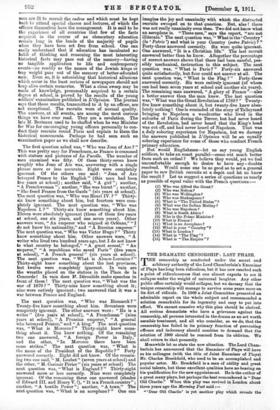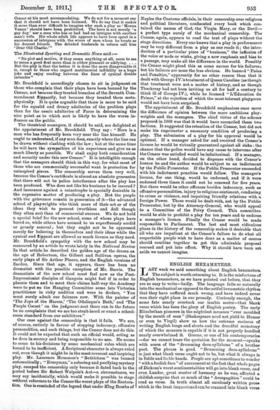THE DRAMATIC CENSORSHIP : LAST PHASE. T HE censorship as conducted under the
secret and arbitrary authority of the Lord Chamberlain's Examiner of Plays has long been ridiculous, but it has now reached such a point of ridiculousness that one almost expects to see it collapse under the weight of universal laughter. Any other public office certainly would collapse, but we daresay that the unique censorship will manage to survive some years more on its diet of ridicule. In 1909 a Joint Committee presented an admirable report on the whole subject and recommended a solution remarkable for its ingenuity and easy to put into effect. We cannot conceive why this plan should be shelved. All serious dramatists who have a grievance against the censorship, all persons interested in the drama as an art worth sensible treatment, and all who consider, as we do, that the censorship has failed in its primary function of preventing offence and indecency should combine to demand that the solution of 1909 should be rescued from its oblivion. We shall return to that presently.
Meanwhile let us state the new situation. The Lord Cham- berlain has announced that the Examiner of Plays will have as his colleague (with the title of Joint Examiner of Plays) Mr. Charles Brookfield, who used to be an accomplished and popular actor. Mr. Brookfield is a man of ability and great social talents, but these excellent qualities have no bearing on his qualification for the new appointment. Ile is the author of a great many plays, but perhaps the best remembered is " Dear Old Charlie." When this play was revived in London about three years ago the Morning Post said :-
" 'Dear Old Charlie' is yet another play which reveals the Censor at his most accommodating. We do not for a moment say that it should not have been licensed. We do say that it makes it more than ever difficult to imagine why such a play as Monne Vanna' should have been prohibited. The hero is not merely a gay dog' nor a man who has or had had an intrigue with another man's wife. His whole adult life appears to have been spent in a succession of intrigues with the wives of men whom he treats as his dearest friends. The deluded husbands in return call him 'Dear Old Charlie.'" The Illustrated Sporting and Dramatic News said :—
"Its plot and motive, if they mean anything at all, seem to me to mean a good deal more than is either pleasant or edifying. . . . But the pity is that the better it is done the more disagreeable it is, except to those who regard matrimonial infidelity, as a huge joke and enjoy reading between the lines of cynical double entendre "
Mr. Brookfield is accordingly chosen to sit in judgment on those who complain that their plays have been banned by the Censor, not because they treated breaches of the Seventh Com- mandment flippantly, but because they treated them meta- physically. It is quite arguable that there is more to be said for the squalid and dreary adulteries of the problem plays than for the comic adulteries of Farce in determining the nice point as to which sort is likely to have the worse in- fluence on the public.
The theatrical managers, it should be said, are delighted at the appointment of Mr. Brookfield. They say : " Here is a man who has frequently been very near the line himself. He ought to understand, if any man does, exactly where the line can be drawn without clashing with the law ; but at the same time he will have the sympathies of his experience and give us as much liberty as possible. We shall enjoy both consideration and security under this new Censor." It is intelligible enough that the managers should think in this way, for what most of those who are commercially successful want is protection for uninspired pieces. The censorship serves them very well, because the Censor's certificate is almost an absolute guarantee that there will not he police interference after the play has been produced. Who does not like his business to be insured ? And insurance against a catastrophe is specially desirable in the expensive matter of producing a play. But the people with the grievance remain in possession of it—the advanced school of playwrights who think more of their art or of the ideas they wish to present (worthless and dull though they often are) than of commercial success. We do not hold a special brief for the new school, some of whose plays have bored us, while others hare seemed to us superfluously sordid or grossly sensual ; but they ought not to be oppressed merely for believing in themselves and their ideas while the cynical and flippant are allowed as much licence as they need.
Mr. Brookfield's sympathy with the new school may be measured by an article he wrote lately in the National Review In that article he described the golden age of the drama as.
the age of Robertson, the Gilbert and Sullivan operas, the early plays of Sir Arthur Pinero, and the English versions of Sardou. Since that age, it appears, there has been no dramatist with the possible exception of Mr. Barrie. The dramatists of the new school must feel now as the Post- Impressionist disciples of Gauguin might feel if in order to placate them and to meet their claims half-way the Academy were to put en the Hanging Committee some late Victorian practitioner in risky nudities and were to declare, " You must surely admit our fairness now. With the painter of 'The Joys of the Harem,' The Odalisque's Bath,' and 'The Purple Corset' on the judgment-seat there can in the future be no complaints that we are too strait-laced or exact a school- room standard from our exhibitors."
Our case against the censorship is that it fails. We are, of course, entirely in favour of stopping indecency, offensive personalities, and such things, but the Censor does not do this. It could not be expected that such an official would, acting as he does in secrecy and being responsible to no one. He seems to come to his decisions by some mechanical rules which are bound to be inefficient. A Scriptural character is always ruled out, even though it might be in the most reverent and inspiring play. Mr. Laurence Housman's " Bethlehem " was banned automatically ; " Everyman," a sobering and purifying mystery play, escaped the censorship only because it dated back to the period before Sir Robert Walpole's Act—a circumstance, we may say incidentally, which would make it possible to stage without reference to the Censor the worst plays of the Restora- tion. One is reminded of the legend that under KIng Bomba of Naples the Customs officials, in their censorship over religious and political literature, confiscated every book which con- tained the names of God, the Virgin Mary, or the Devil— a perfect type surely of the mechanical censorship. The Censor, again, appears to read the text of plays without the stage directions. Every one knows that a play in performance may be very different from a play as one reads it ; the intro- duction of a particular piece of " business," the inflexion of the voice or nods or winks, giving a new emphasis and bias to a passage, may make all the difference in the world. Possibly the Censor might plead this as some excuse for his failures; but his failures are none the less obvious. He banned " Pains and Penalties," apparently for no other reason than that it dealt with George IV.'s treatment of Queen Caroline (as though that treatment were not a matter of history, and as though Thackeray had not been inviting us all for half a century to think ill of George IV.), while he licensed " L'Education du Prince," at the rejection of which the most tolerant playgoers would not have been surprised.
The appointment of Mr. Brookfield emphasizes once more the difference of opinion between the more ambitions play- wrights and the managers. The chief virtue of the scheme proposed in 1909 was that it would have reconciled these two factions. It suggested the retention of the Censor, but did not make his imprimatur a necessary condition of producing a play. The submission of a play for his approval would be optional. If a manager asked for and received the Censor's licence he would be virtually guaranteed against all risks : the chance that the police would have any cause to intervene after the Censor was satisfied would be infinitesimal. If a manager, on the other band, decided to dispense with the Censor's licence he and the author would be subject to an indictment by the Public Prosecutor. If the Public Prosecutor succeeded with his indictment penalties would follow. The manager's licence, for one thing, would be endorsed, and if it were endorsed three times it could not be renewed for five years. But there would be other offences besides indecency, such as offensive personalities, injury to religious sentiment, conducing to crime or violence, and impairing friendly relations with a foreign Power. These would be dealt with, not by the Public Prosecutor, but by the Attorney-General, who would appeal to a Committee of the Privy Council. This committee would be able to prohibit a play for ten years and to endorse a manager's licence. Finally the Censor would be made responsible to Parliament. The last and most ridiculous phase in the history of the censorship makes it desirable that all who are impatient at the Censor's failure to do what all respectable people wish to have done as a matter of course should combine together to get this admirable proposal rescued and put into effect. Why it should have been set aside we cannot imagine.



































































 Previous page
Previous page